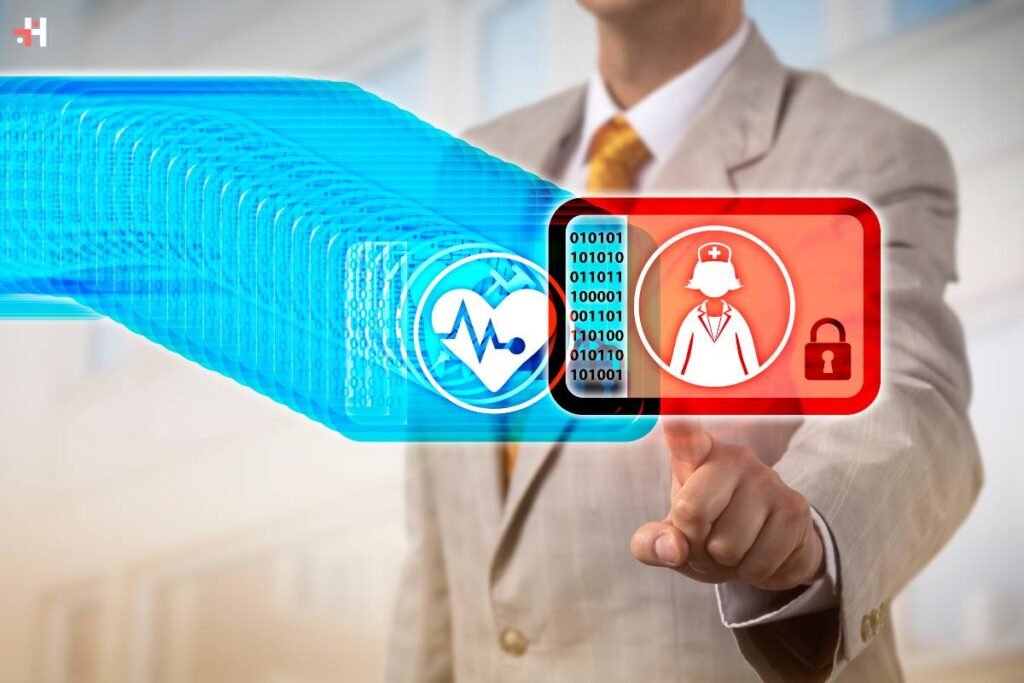The digitization of patient records, interconnected systems, and the exchange of sensitive information have become integral aspects. However, with these advancements come heightened concerns about data security and integrity. Traditional centralized systems have proven susceptible to breaches and unauthorized access, necessitating innovative solutions.
Blockchain in healthcare data security, often associated with cryptocurrencies like Bitcoin, has emerged as a transformative technology with the potential to revolutionize healthcare data security. This article delves into the multifaceted applications of blockchain in healthcare, exploring its role in securing patient records, enhancing interoperability, streamlining administrative processes, ensuring drug traceability, and empowering patients with data ownership.
Securing Patient Records:

Patient records are a treasure trove of sensitive information, ranging from medical history to treatment plans and billing details. Historically, centralized storage systems have made this data vulnerable to breaches. Blockchain in healthcare data security introduces a decentralized approach, distributing data across a network of computers. Each patient record is encrypted, forming a chronological and unalterable history of the patient’s health journey. Authorized individuals, equipped with cryptographic keys, can securely access the data. This not only reduces the risk of a single point of failure but also ensures that patient records remain confidential and tamper-proof.
Enhancing Interoperability:
The lack of interoperability, or the seamless exchange of healthcare information between different systems, has long been a challenge in the industry. It offers a standardized and decentralized platform for sharing information, breaking down data silos. Through block-chain, healthcare providers gain access to a patient’s complete medical history, irrespective of its origin. This not only improves the continuity of care but also facilitates more accurate diagnoses and personalized treatment plans. The transparent and decentralized nature of blockchain in healthcare data security fosters a collaborative environment for healthcare stakeholders.
Streamlining Administrative Processes:

Administrative processes in healthcare, such as billing and claims processing, are often marred by inefficiencies and errors. Block-chain’s introduction of smart contracts – self-executing contracts with the terms directly written into code – presents an opportunity to automate and streamline these operations. Smart contracts can automatically execute payment processes based on predefined conditions, reducing administrative burdens and minimizing the risk of fraud. The transparency and automation afforded by blockchain technology have the potential to revolutionize the administrative landscape of the healthcare sector.
Ensuring Drug Traceability:
The pharmaceutical industry grapples with the challenge of ensuring the authenticity and traceability of drugs. Counterfeit drugs pose risks to patient safety and contribute to revenue losses for pharmaceutical companies. It introduces a reliable and transparent method for tracking the entire supply chain of pharmaceuticals. Every transaction related to the production, distribution, and sale of a drug can be recorded on the blockchain in healthcare data security. This enables stakeholders, including manufacturers, distributors, and regulatory authorities, to trace the journey of a drug from its origin to the end-user. By introducing such traceability, blockchain in healthcare data security ensures the integrity of the pharmaceutical ecosystem.
Empowering Patients with Data Ownership:

Traditionally, patients have had limited control over their health data. It empowers patients by providing ownership of their records through private keys. Patients can grant access to their data to healthcare providers as needed, fostering a more patient-centric approach to healthcare. This aligns with the principles of data privacy and encourages patients to actively participate in their healthcare decisions. The decentralized and transparent nature of blockchain in healthcare data security ensures that patients have control over who accesses their data and for what purpose, instilling a sense of trust and agency.
Challenges and Considerations with Blockchain in Healthcare Data Security:
While the potential benefits of implementing blockchain in healthcare are substantial, it’s crucial to acknowledge the challenges and considerations associated with its adoption. Scalability, integration with existing systems, and regulatory frameworks are areas that require careful consideration. Scalability issues, especially with certain block-chain consensus mechanisms like proof-of-work, must be addressed to ensure the technology’s feasibility on a broader scale. Additionally, integrating block-chain with existing healthcare systems poses challenges that demand innovative solutions. Moreover, navigating regulatory frameworks is crucial to ensuring compliance and fostering widespread adoption.
Conclusion:
In conclusion, blockchain technology stands as a beacon of hope in addressing the pressing concerns of data security and integrity in the healthcare sector. From securing patient records and enhancing interoperability to streamlining administrative processes, ensuring drug traceability, and empowering patients with data ownership, the applications of blockchain in healthcare data security are vast and impactful.
As the industry grapples with the evolving landscape of healthcare data, embracing innovative solutions like block-chain becomes not only a necessity but a progressive step towards a more secure, efficient, and patient-centric future. The journey towards integrating blockchain in healthcare data security is undoubtedly complex, but its potential to transform the industry is profound and promises a new era of data security and patient empowerment.
FAQ:
Q1. How does blockchain contribute to enhancing healthcare data security?
Through its decentralized structure, secures healthcare data by distributing it across a network of computers. Each patient record is encrypted and forms an unalterable history, reducing the risk of breaches and ensuring tamper-proof confidentiality.
Q2. How does blockchain address interoperability challenges in healthcare?
It standardizes and decentralizes data sharing, breaking down silos. It provides a platform for seamless exchange of healthcare information, improving the continuity of care, facilitating accurate diagnoses, and fostering collaboration among healthcare stakeholders.
Q3. In what ways does blockchain streamline administrative processes in healthcare?
It introduces smart contracts, automating administrative operations like billing and claims processing. These self-executing contracts reduce inefficiencies, minimize the risk of errors, and enhance transparency, revolutionizing the administrative landscape in healthcare.
Q4. How does blockchain ensure drug traceability in the pharmaceutical industry?
It records every transaction in the drug supply chain, ensuring transparency. This traceability, from production to end-user, safeguards against counterfeit drugs, enhances patient safety, and maintains the integrity of the pharmaceutical ecosystem.
Q5. How does blockchain empower patients with data ownership in healthcare?
It grants patients ownership of their health data through private keys. Patients control access to their records, aligning with data privacy principles and encouraging active participation in healthcare decisions, fostering trust and agency.









